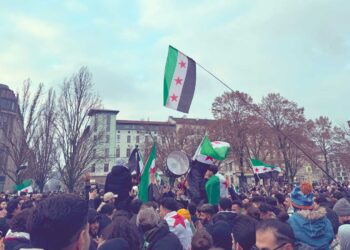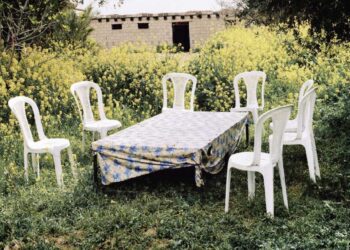Scenes of violence at the border are well known, from migrants beaten by Hungarian border guards at the border with Serbia, to Haitian migrants chased by US mounted border patrols at the border between the US and Mexico. But what about love?
What are the effects of hostile policies against migration when couples are separated by the power of their passports? US author and journalist Anna-Lekas Miller decided to navigate this in her first book “Love Across Borders. Passports, Papers and Romance in a Divided World” (Algonquin Books), reflecting also on her own experience.
From Istanbul to Erbil, for love
It is said that the personal is political, but the personal is also journalistic. Since the beginning of the so-called refugee crisis, there has been a debate on whether journalists should get involved or keep themselves detached and “objective” from the suffering of millions of displaced people.
“I never wanted to be one of those detached journalists in the first place. That became so much harder when I made the decision to move to the Middle East, where I trace my roots [from Lebanon]. I started meeting people of my age, exactly like me, for all intents and purposes and we had so much in common” Lekas Miller tells UntoldMag.
However, as Lekas-Miller points out, they were born in the Middle East, they were refugees from Syria or Palestine, and therefore their freedom of movement was very much restricted compared to hers.
A documentary dedicated to the late US historian Howard Zinn is tellingly titled “You can’t be neutral on a moving train” and this applies to all kinds of injustices; in Lekas-Miller’s case, the central element is the encounter with the man who became her partner, a fellow journalist, Salem Rizk, from Syria, in Istanbul.
When Anna and Salem fell in love and lived together, the crackdown on refugees from the Turkish government came into place, and Rizk, who is Syrian, could not stay any longer in Turkey and could not return to Syria, putting the author in front of a consequential choice.
In the end, Miller followed Rizk to Iraq, in Erbil, and also ended up reporting from Mosul, when the Daesh militias had only been recently pushed away by the Iraqi forces and their regional and international allied forces.
Then Anna and Salem’s story follows the byzantine tracks of the asylum claims for the latter, the cruelty of Trump’s Muslim ban, and a multitude of challenges, all the way to London.
Her personal experience led Miller to put together the stories of those who have faced what happens when border policies systematically fall over relationships.
Borders are different and passports are not created equal
The cruelty of border policies tends to be accepted as if they were unchangeable and had always existed, but this is not the case.
“It is really important to remember that it was not always this way. In the US, you would have politicians comparing their family’s privileged “Mayflower” history of migration and it is very factually inaccurate to compare these experiences with Latin Americans trying to cross the Mexico-US border today,” says Lekas Miller.
“We are talking about people who have to either experience the asylum system or live like undocumented people. There is this element and it is important to be honest about it and the fact that there are so many unjust laws curtailing people’s freedom that there have been in the past. This is the way we need to see the migration debate fairly”.
“I also think that it is interesting to consider what the world looked like with open borders. You had people from Europe and the Middle East going to the United States to settle there, you also had Europeans colonising Africa and other parts of the world. In a way, this shows what open borders meant for better and for worse. It would be important to think about that and reimagine how this could look like now and in the future” Lekas Miller adds.
Colonialism and the history of passports are strongly connected, and the Otherisation and the hierarchy of passports and related rights are strictly linked with this.
“I am grateful that the book gave me a space to navigate my identity as a US citizen of Lebanese descent. We have a community in the diaspora from the Middle East of people who fit this profile. We are proud of our connection to the Middle East but we have a Western passport. I see a lot of people struggling to put this together and I wanted to do this and create a model for other people”. A model for other people of Middle Eastern descent with a Western passport to bridge the gap between what can be seen as privilege and the connection with their family roots.
A central element of the book stands at the core of the global debate on migration, but at the same time is severely overlooked: the power of passports.
If we simply look at the Nomad Passport Index for 2023 we can clearly identify the inequality between passports; while the passports of the Global North countries occupy the first positions and the United Arab Emirates the very first, countries like Somalia, Pakistan, Iraq, Syria, Ethiopia and Eritrea stand at the bottom of the list.
The more a passport requires a visa, the more the freedom of movement of the Global South citizens is at the mercy and the whims of the bureaucracy in the Global North, with all that it entails.
The author also delves into the history of passports as we know them, born out of the French Revolution, focused on internal movement and how much this has changed in the XX century, with passports becoming more and more a trademark of class and geographical privilege, if we consider how some countries have golden passports schemes.
Every conversation on migration that does not face this crucial point, as Lekas Miller explains and points out, is a flawed one at best.
The emotional wounds left can be found in many of the stories narrated in the book.
Love with or without borders
There is the story of Wala’a and Ahmed, who grew up in Aleppo, a story with a happy ending, after the Syrian civil war and the dangerous crossing of the Aegean Sea.
There is the story of Amal and Mohammed; they both grew up in the same village in Yemen but grew up to lead very different lives, the former stayed in the country, while the latter moved to the US with his family.
Still, their feelings crossed continents and years of separation, and they found love in one another, but the Muslim ban by the Trump administration left Amal stranded in Djibouti for a long time, while Mohamed was trying to keep the attention on their story in the eyes of lawyers and journalists.
While their story had a happy ending, not all similar stories ended in the same way. In 2018, a Yemeni-US citizen, Mahmood Salem had drowned in depression and debt, while attempting to bring his wife and children to the US in the midst of the ban and ended up shooting himself.
After his suicide, a visa was waivered for his wife and family to attend his funeral in Louisiana.
Then there is Ava, whose husband Josè was deported to Mexico.
And then there is the story of Mona and of the scandalous treatment of the Windrush generation [those Jamaican and Caribbean citizens, and their children who migrated to the UK following WWII and found themselves stateless or deported back to countries where they were only born or only their parents were born] in the United Kingdom by the Home Office, a testament to how institutional racism can bring borders back.
Lekas Miller is a passionate and real kaleidoscope of different experiences, through different continents and different paths.
Another element that the author highlights is the need to bring closer together, through smaller steps, the imbalance between the Global North and South, something that sometimes may escape the attention of those who are focused on migration justice and removing borders, as there is a lot of work to do in the middle, also in the name of love.








